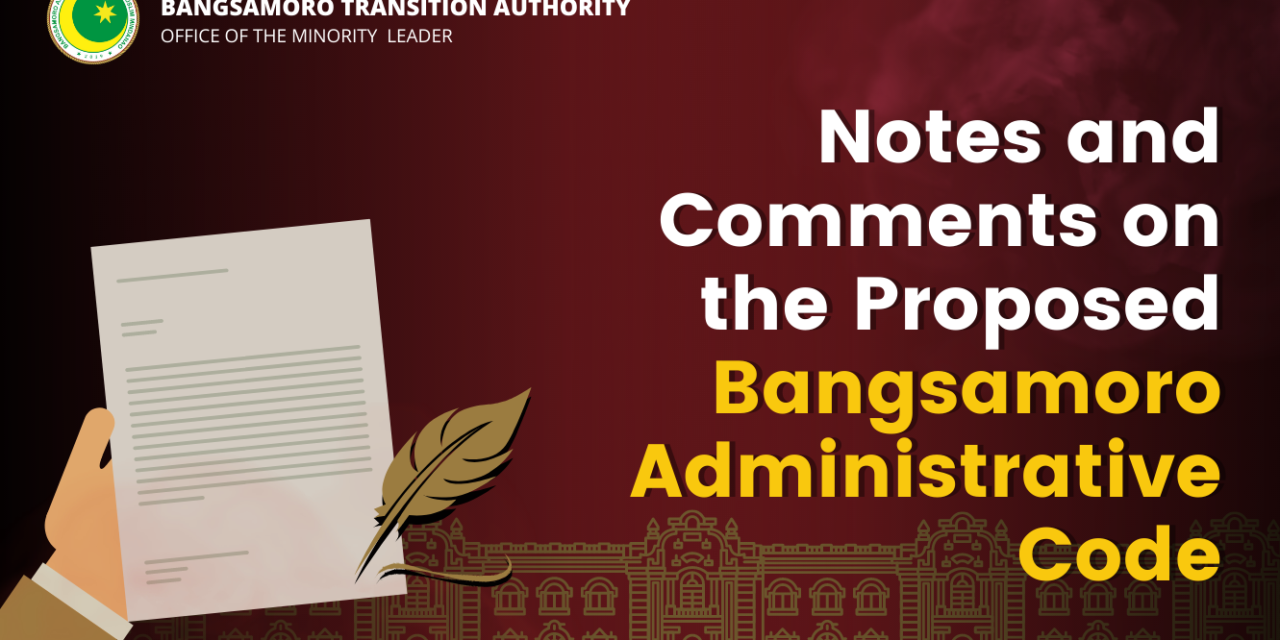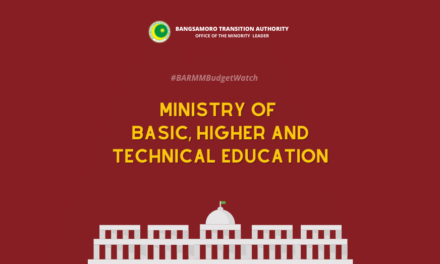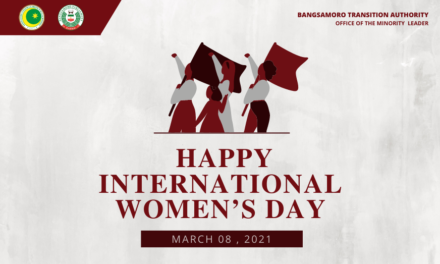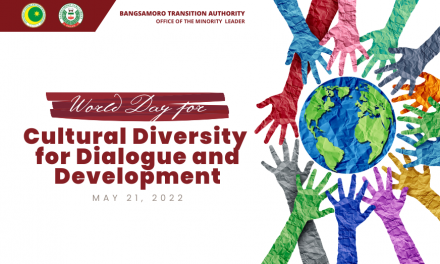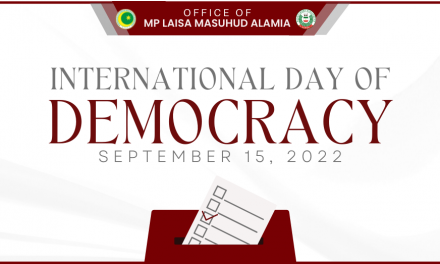Crucial to the success of the transition period and the first elections in 2022 is the promulgation of key laws, notably the first-listed function vested by the Bangsamoro Organic Law (BOL) upon the Bangsamoro Transition Authority. The Bangsamoro Administrative Code (BAC) is arguably among the most important, since it will dictate how the regional government shall run, and how it shall interact with its people.
After a review of Cabinet Bill No. 60, three main observations are submitted for consideration:
- The Chief Minister should be primus inter pares among fellow Members of Parliament, and not a Regional Governor with lawmaking powers;
- The Parliament should follow and assert democratic principles in carrying out its political processes; and,
- The regional government agencies should have statutory guidance on how to engage the national government.
Brief Discussion
1. The Chief Minister should be primus inter pares among Members of Parliament, and not a Regional Governor with lawmaking powers.
One of the prime motives for adopting a parliamentary system in the Bangsamoro is the dispersal of political power among duly elected representatives. However, the current version of the Administrative Code undeniably borrows heavily from the national template. As Atty. Mike Yusingco pointed out in his policy brief on the draft code,[1] the BAC acknowledges this incongruity in structure, but then fails to adapt to fundamental differences.
National and regional governmental powers are not similarly separated. The national government follows a unitary presidential structure with a bicameral Congress, while the regional government assumes a unicameral parliamentary form.In the former, executive power is vested solely in the President, who is tasked to faithfully execute the laws. The chief executive of the national government has no lawmaking power;
only supplementary rulemaking power to effectively implement laws that were enacted by the Legislative. The President and Congress are supreme in their own separate spheres, and mutually check each other’s powers to prevent grave abuse of discretion.
In the latter, executive and legislative powers are married and vested upon the Parliament. Members of Parliament (MPs) enact laws, and among them, elect a Cabinet which shall exercise executive authority. Being chosen to be part of the Cabinet is not a grant of power or of an entirely new position, but an assignment of duty to carry out laws. Under a parliamentary system, the Prime or Chief Minister is but merely a first among equals in the Cabinet, possessing power indistinguishable from other Ministers, but accorded with respect.
It is noted, however, that this power structure is nuanced in the case of the BARMM’s parliamentary system as provided for by the BOL. This is by granting the Chief Minister the powers to both head the executive authority (Article VII, Sec. 4), and appoint heads of ministries, agencies, bureaus, and offices of the Bangsamoro Government and its entities (Article VII, Sec. 32). But even with this widened power, parliamentary democratic principles should still be clearly established.
The proposed Administrative Code seemingly falls short to reflect such as it instead creates a Chief Minister that is far more powerful — a regional chief executive and an exceptionally dominant lawmaker, all rolled into one.
The powers of the Chief Minister were lifted directly from Muslim Mindanao Act. No. 287, which provided for the powers of the Regional Governor. Essentially, the Chief Minister is proposed to possess power of control over all regional executive departments and offices (Book IV, Title I), including the continuing authority to effectively reorganize the structure, powers, and functions of said departments and offices (Book IV, Title II).
There is a delicate policy debate to be had on allowing the Chief Minister to assume control over all executive organs of the regional government, and on allowing for continuing reorganization powers. These are dangerous provisions because they necessarily elevate the Chief Minister above and beyond supposed peers in the Cabinet. The continuing authority to transfer functions from the Office of the Chief Minister’s to other ministries, and vice versa, borders on bypassing the Parliament’s legislative power, as well as derogating the authority of other Ministers. Book V, Sec. 1 essentially invokes the doctrine of qualified political agency: that the other Ministers are merely alter-egos of the Chief Minister, and that their acts can be overturned. Further, Title IV, Sec. 15 proposes that Cabinet members may be replaced unilaterally by the Chief Minister, even though it was the Parliament that elected them to lead the Ministries.
If allowed, the Chief Minister may effectively and unilaterally amend provisions of the Administrative Code (particularly on the powers and functions of each ministry) through simple executive orders or memorandum circulars. On the positive side, this allows the executive to run smoothly on its own, unburdened by the need to rally support from Parliament for simple matters of reorganization. On the negative, this also strongly centralizes power towards the Chief Minister and creates massive room for partisan politics. Not to mention that the Chief Minister is simultaneously a legislator, and by virtue of the laundry list of executive powers, a very influential one at that.
2. The Parliament should follow and assert democratic principles in carrying out its political processes.
Perhaps even more worrisome is Title III, sec. 16, granting the right to initiate legislation exclusively to the Government of the Day. Based on the structure described by the Code, it’s easy to see that the Chief Minister is essentially the Government of the Day. In other words, the Chief Minister would also be able to control the legislative by gatekeeping what laws could be considered and heard by the Parliament, on top of absolute control over the executive.
This is a gross denigration of representative democracy. It is untenable that duly-elected MPs, on their own, could only file bills concerning their districts, while members of dominant political factions get to monopolize regional lawmaking from beginning to end. An absurd situation is created: a constitutional dictatorship, wherein the power to create and modify laws and the power to execute them are reposed in just one person. The spirit and goal of adopting a parliamentary form of government — to diffuse power, as a direct rejection of how heavily it is concentrated in the national government — is ultimately perverted. Becoming Chief Minister is suddenly a winner-takes-all gambit, leaving the rest of the government perpetually frail and politicized.
The Parliament, then, should be allowed to assert its authority to legislate without undue restrictions. Constituents of MPs who do not belong to victorious political parties should not be unduly prejudiced. The approval of the Cabinet need not be sought to initiate legislation. To quote Atty. Yusingco, the Bangsamoro parliament should not be based on “palakasan.”
Ultimately, the peace process between the government of the Philippines and the Moro Islamic Liberation Front had been very clear about its premise, that there was a need to change the system as “the status quo is unacceptable.[1]” The shift to a parliamentary form of government and legislating the BOL as such supported this thrust. It is crucial therefore that we and the policies we forge hereon remain true to this intent and spirit.
3. The regional government agencies should have statutory guidance on how to engage the national government
A persistently tricky problem for public administrators working in or with the Bangsamoro government is the confusion and lack of guidance on how regional agencies and offices should interact with the national government. This issue was brought to attention recently, when DPWH’s implementation of national highways raised questions on what powers are reserved to the national and to the regional, and on how the right to self-determination is affected by those delineations.
The Bangsamoro people stand to benefit greatly from some national programs, but are forced to wait or make do without such due lack of legal clarity. Investments and development projects could also be unleashed, once modes of engagement between regional and national are standardized and harmonized.
A preferable and proactive solution would be for the Parliament to definitively draw a line and prescribe intergovernmental relations, either through the BAC or through a separate law, and not merely general principles of engagement or through regular meetings.
Other Notes, Comments, and Questions
| Cabinet Bill No. 60 | Notes/Comments/Questions |
| Sec. 3. Declaration of Principles and Policies. – … g. The Bangsamoro Government shall develop a self-reliant and independent regional economy effectively controlled by the Bangsamoro ; … | Does the underlined portion mean that it is the Bangsamoro Government’s policy to ensure that the Bangsamoro people dominate the local/regional market, for all economic sectors? |
| Book I, Ch. 2, Sec. 8. Bangsamoro Hymn. – The official lyrics and rendition of the Bangsamoro Hymn shall be in accordance with the official musical arrangement and composition embodied in Bangsamoro Autonomy Act No. 7. Whenever the Bangsamoro is sung , it shall always be preceded by the singing of the Philippine National Anthem. | Amend underlined portion to: “Whenever the Bangsamoro hymn is sung.” |
| Book I, Ch. 6, Sec. 22. Non-suability of the BARMM. – No suit shall lie against the Bangsamoro Autonomous Region in Muslim Mindanao (BARMM) except with its consent as provided by law. | What is the legal basis for granting state immunity to the regional government? Does this not draw upon elements of sovereignty, and hence, tread dangerously into the definition of an associated state? (See Province of Cotabato v. GRP) Re: the underlined portion – the BARMM is an administrative region, and the Bangsamoro Government is the entity in charge of governing it. Hence, non-suability should refer to the Bangsamoro Government, and not the BARMM. |
| Book I, Ch. 6, Sec. 22. Bangsamoro Government’s Responsibility for Acts of Agents. – The Bangsamoro Government shall be legally bound and responsible only through the acts performed in accordance with the Bangsamoro Organic Law and the laws by its duly authorized representatives. The BARMM shall not be bound by the mistakes or errors of its officers or agents in the exercise of their functions. | As set forth in the definition of terms, it is the term “Bangsamoro Region” that shall be used interchangeably with “Bangsamoro Autonomous Region in Muslim Mindanao,” not “Bangsamoro Government.” As noted above, the BARMM and Bangsamoro Gov’t are two different things. Consider changing the underlined to read “Bangsamoro Government.” |
| Book II, Sec. 1. Intergovernmental Relations Body. – … The Chief Minister shall appoint or designate representatives of the Bangsamoro Government to the IGRB, as well as its Secretariat, through a Special Memorandum Order . Sec. 2 Other IGR Bodies. – The following are the other IGR Bodies, whose Bangsamoro Government representatives shall likewise be appointed or designated by the Chief Minister through a Special Memorandum Order , unless otherwise provided in the Bangsamoro Organic Law: X X X Sec. 5. Selection of representatives. – The Chief Minister shall select the representatives in paragraphs (d) and (e) of Section 3 above from a list of nominees based on the following qualifications: a. Residency. Representatives-nominees must be residents and registered voters of the Bangsamoro Autonomous Region, of legal age, not otherwise disqualified by law, with a proven track record in the community or sector represented, and must be willing and able to participate in all activities of 14 the Council of Leaders. X X X If no nominations are submitted, the Chief Minister shall select and appoint any qualified person of the category to the vacant position. | In accordance with the recommended changes in power, perhaps the power to appoint to the IGRB should be vested in the Parliament through a resolution, or perhaps in the Cabinet as a whole, instead of only the Chief Minister. Re: qualifications for selection of representatives – what does a “proven track record” mean? Will this be similar to how partylists nominees are selected? |
| Book III, Title I, Sec. 1. Powers of Government. – The powers of government shall be vested in the Parliament which shall exercise those powers and functions expressly granted to it in the Bangsamoro Organic Law, and those necessary for, or incidental to, the proper governance and development of the Bangsamoro Autonomous Region. It shall set policies, legislate on matters within its authority, and elect a Chief Minister who shall exercise executive authority on its behalf. Sec. 3. Executive Authority. – The executive function and authority shall be exercised by the Cabinet which shall be headed by a Chief Minister. The Chief Minister shall be elected by a majority vote of all the members of the Parliament. X X X | Note this contradiction in the BOL: on Sec. 2, Art VII (Sec. 1 Title 1, Book III in this bill), “executive authority” is declared to be exercised by the Chief Minister. In the following section (Sec 3 in this bill), “executive function and authority” is exercised by the Cabinet, headed by a Chief Minister. This means that there is room to temper the centralization of powers towards the Chief Minister. The emerging recommendation is to spread the power to the Cabinet, as a body. |
| Book III, Title II, Sec. 2. Qualifications – … d. A resident of the Bangsamoro Autonomous Region for at least fifteen (15) years; and X X X | Rephrase this qualification to be more specific. Strictly speaking, this is an impossible condition. The BARMM has only existed since 2019. |
| Book III, Title III, Sec 16. Right to Initiate Legislation. – The right to initiate legislation is primarily lodged in the Government of the Day. District-specific bills may, on the other hand, be introduced by the members of the Parliament elected from single parliamentary districts referred to in Section 7, Article VII of the Bangsamoro Organic Law. Members of Parliament may, both in plenary session and in committee, table requests, questions, interpellations and motions for which presence of the Chief Minister and/or the Bangsamoro Cabinet may be summoned. The Parliament shall regulate popular initiative as regards the submission of bills which are to be considered by it, in accordance with whatever is established by the Parliamentary Rules and Procedures. | What is the basis for this right? Does this not derogate the principle of representative democracy? Does this not effectively make the Government of the Day a super-entity that controls both the executive and legislative, with members of the minority relegated as passive assenters or dissenters? |
| Book III, Title IV, Sec. 4. Powers, Duties, and Functions of the Chief Minister. – The Chief Minister shall exercise the powers, duties, and functions enumerated under Section 32, Article VII of the Bangsamoro Organic Law. | While these are the statutory powers vested by Congress to the Chief Minister, those powers that are not granted by the BOL could be systematically sought out and diffused or tempered. |
| Book III, Title IV, Sec. 11. Organization of the Bureaucracy. … In the exercise of executive authority, the Chief Minister shall have continuing authority to reorganize executive offices, as provided under Sec. 74, Chapter 4, Title 32 I, Book IV of this Code. Book IV, Title II, Sec. 74. Continuing Authority of the Chief Minister to Reorganize Executive Offices. – The Chief Minister , subject to the provisions of the Bangsamoro Organic Law and in order to achieve simplicity, economy and efficiency, shall have continuing authority to reorganize the administrative structure of the Office of the Chief Minister. For this purpose, he/she may take any of the following actions: (1) Restructure the internal organization of the Office of the Chief Minister Proper by abolishing, consolidating or merging units thereof or transferring functions from one unit to another; (2) Transfer any function under the Office of the Chief Minister to any other ministry or agency as well as transfer functions to the Office of the Chief Minister from other ministries and agencies ; and (3) Transfer any agency under the Office of the Chief Minister to any other ministry or agency as well as transfer agencies to the Office of the Chief Minister from other ministries or agencies. | Diffuse power from solely the Chief Minister’s, to perhaps the Cabinet’s. |
| Book III, Title IV, Sec. 15. Term of Office of Ministers and their Deputies. – The term of office of Ministers and their deputies shall be co-terminus with the Chief Minister, unless sooner removed by the latter. | Consider re-working this, to more closely equalize the status of Chief Minister with other Ministers |
| Book IV, Title I, Sec. 1. Power of Control. – As Head of the Bangsamoro Government, the Chief Minister shall have control of all ministries, agencies, offices, bureaus, commissions, boards and instrumentalities of the Bangsamoro Government. The Chief Minister shall ensure that laws are faithfully executed. | This title (even perhaps the entirety of book IV) drew largely from MMA Act No, 287, describing the powers of the Regional Governor. Maybe it would be helpful to revisit these provisions to temper the powers of the Chief Minister, and to re-imagine the role of the Chief Minister as one that more closely reflects being first among equals in the Cabinet. |
Recommendations
- Limit or remove the Chief Minister’s power of control over other Cabinet Members. After all, the BOL vested executive authority over the Cabinet, and not solely upon the Chief Minister (Article VII, sec. 4). Mutual respect should be afforded by Ministers to each other. Perhaps controversial decisions should be decided by the Cabinet as a collegial body, and not merely by the Chief Minister.
- Limit the Chief Minister’s continuing authority to reorganize to offices, agencies, powers, and functions found within the Office of the Chief Minister. Further changes should be coursed through Parliament, or at least through the entire Cabinet.
- Remove the Chief Minister’s power to remove Ministers from Cabinet posts. Such authority should only be granted to the Parliament.
- Remove the provision forcing the term of office of Ministers and their deputies to be co-terminus with that of the Chief Minister. Similarly, such power to forcibly remove should be reserved for the Parliament.
- Remove the Government of the Day’s right to initiate legislation for being prejudicial and contrary to the spirit of a democratic parliament. Doing so disincentivizes rigorous academic discourse, discourages citizen participation, and reduces the legislative process to small, tepid political transactions.
- Insert specific provisions on intergovernmental relations to provide definitive statutory guidance in engaging the national government, not prescribe the principles of engagement or provide a venue for frequent and regular meetings.
[1] Michael Henry Yunsingco (August 2020). “Emerging Issues on Cabinet Bill No. 60: Bangsamoro Administrative Code,” Institute for Autonomy and Governance.
[2] Framework Agreement on the Bangsamoro, signed October 15, 2012.

